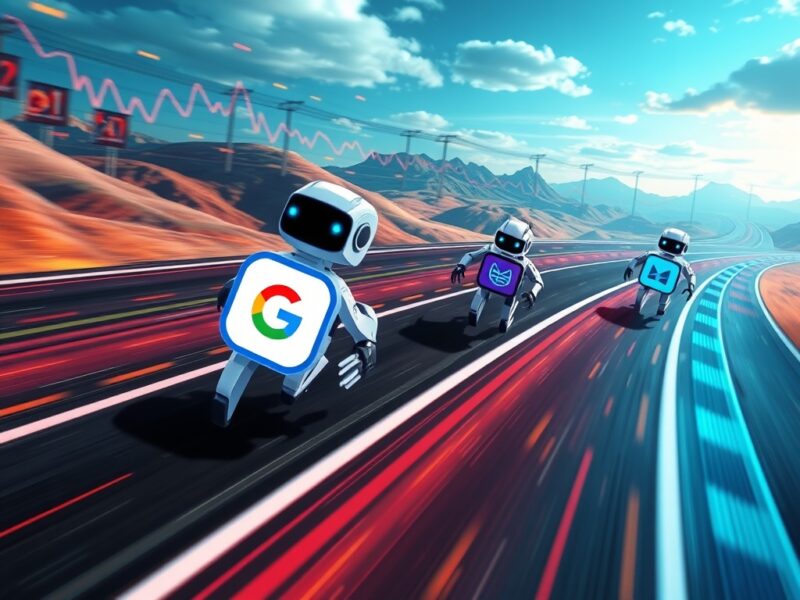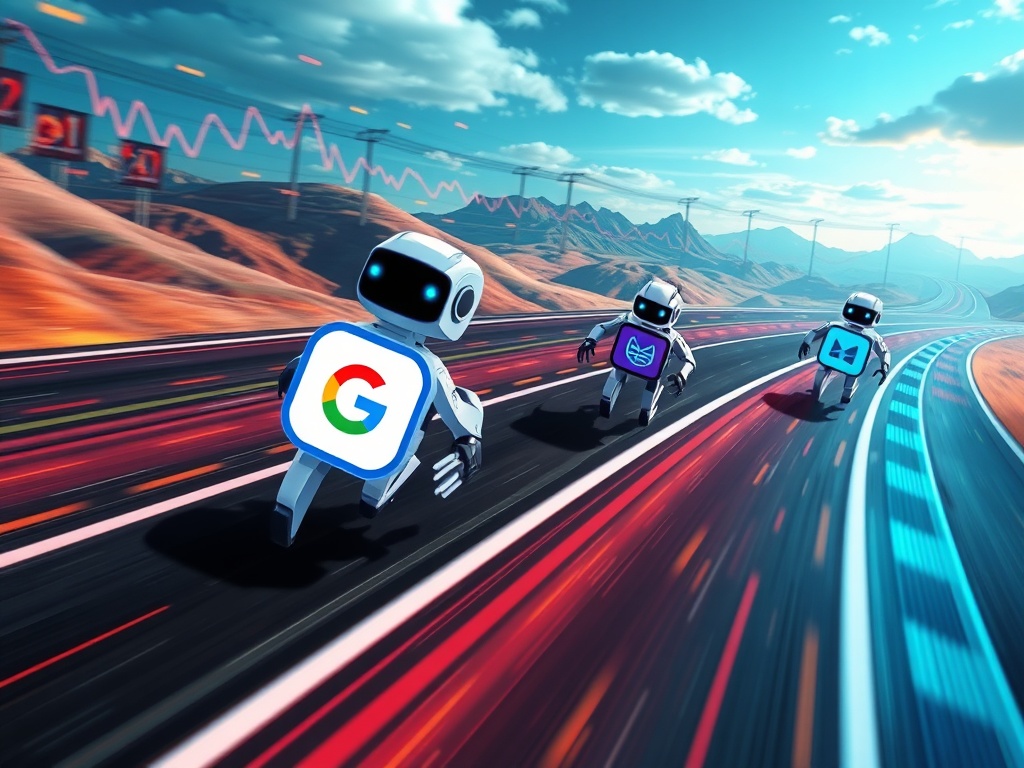ChatGPT Rivals Surge: Google Gemini AI and xAI Grok Intensify AI Chatbot Competition
0
0

BitcoinWorld

ChatGPT Rivals Surge: Google Gemini AI and xAI Grok Intensify AI Chatbot Competition
In the fast-paced world of technology, where innovation drives market shifts, the race for AI dominance is intensifying. For those closely watching the crypto space, understanding the broader tech landscape, especially in artificial intelligence, is crucial. A new report from venture capital firm Andreessen Horowitz (a16z) sheds light on this escalating competition, revealing that while OpenAI’s ChatGPT has long held the crown, its formidable ChatGPT rivals are rapidly gaining ground. This comprehensive fifth edition of a16z’s consumer AI report provides a deep dive into two and a half years of evolving user engagement with AI products, painting a clear picture of an exciting and dynamic market.
The Escalating Race Among ChatGPT Rivals
The latest a16z AI report highlights a significant shift in the consumer AI landscape: competitors are closing the gap on OpenAI’s popular chatbot. This isn’t just a minor adjustment; it signals a maturing market where innovation is flourishing beyond the initial frontrunner. The report, which spans two and a half years of consumer data, consistently features 14 key companies that have shaped how people interact with AI. These include familiar names like ChatGPT, Perplexity, Poe, Character AI, Midjourney, Leonardo, Veed, Cutout, Eleven Labs, Photoroom, Gamma, Quillbot, Civitai, and HuggingFace. These platforms collectively showcase the diverse applications of AI, from general assistance and companionship to advanced image and video editing, voice generation, productivity tools, and model hosting.
Beyond these consistent players, five other companies have made their mark in almost every report since the first iteration: Claude, DeepAI, JanitorAI, Pixelcut, and Suno. Their sustained presence underscores the growing demand for general AI use, companionship, image editing, and music generation. The persistent appearance of these companies underscores their strong user adoption and the essential services they provide in the rapidly evolving AI ecosystem.
The Remarkable Rise of Google Gemini AI
For the first time in the series, Google has made a significant leap, gaining four spots on the list of top generative AI consumer web products. This impressive ascent is attributed to the separate tracking of its key AI offerings: Gemini, AI Studio, NotebookLM, and Google Labs. These products now operate under their own distinct domains, allowing for more precise measurement of their individual growth trajectories.
On the mobile front, Google Gemini AI is rapidly catching up to ChatGPT. While Gemini still has almost half as many monthly active users as ChatGPT, its growth is undeniable. Unsurprisingly, Gemini’s AI technology demonstrates stronger adoption on Android devices, accounting for nearly 90% of its mobile monthly active user base. On the web, Gemini also secured the second position, capturing approximately 12% of ChatGPT’s total visits. This strong performance across both web and mobile platforms signals Google’s serious commitment and increasing influence in the AI chatbot competition.
Google’s AI Product Ecosystem: A Snapshot
Google’s strategic approach to AI involves a suite of distinct products catering to various user needs:
- Gemini: A general-purpose AI chatbot, positioned as a direct competitor to ChatGPT. It shows strong performance on both web and mobile, especially on Android.
- AI Studio: This developer-focused sandbox, designed for building with Gemini models, made a strong debut, entering the top 10 list of AI web products at the 10th spot. It provides tools for developers to innovate using Google’s advanced AI capabilities.
- NotebookLM: Ranking 13th on the web, NotebookLM is tailored for research and knowledge management, helping users synthesize information and generate insights.
- Google Labs: A hub for Google’s experimental AI projects, including Flow, Project Mariner, and Doppl, Google Labs secured the 39th position, showcasing the company’s continuous exploration of new AI frontiers.
xAI Grok‘s Explosive Growth Trajectory
The report also highlights the meteoric rise of xAI Grok, Elon Musk’s AI chatbot. Grok’s growth is particularly striking given its recent introduction. It went from having no standalone app at the end of 2024—initially launched within the X platform—to accumulating upwards of 20 million monthly active users. This rapid expansion positions Grok as a significant player in the AI landscape, demonstrating how quickly new entrants can capture market share with compelling offerings.
Grok secured the fourth spot on the web and ranked 23rd on mobile, indicating a strong cross-platform presence. A notable surge in its user base occurred in July 2025, when Grok climbed nearly 40% following the release of Grok 4. This event underscores the impact of model updates and new feature rollouts on user engagement and market positioning within the intense AI chatbot competition.
Broader Trends in AI Chatbot Competition
The landscape of AI chatbot competition extends beyond just Google and Grok. Meta AI, for instance, ranked 46th on the web, maintaining its position from March. However, it did not make the list of top mobile AI apps. This performance was partly hampered by concerns regarding Meta AI sharing some users’ posts publicly without explicit consent, highlighting the critical importance of privacy in consumer AI adoption.
Other established players also showed varied performance. DeepSeek and Claude saw different trajectories. DeepSeek experienced a flattening of growth on mobile, falling 22% from its peak, and an even sharper drop-off on the web, down more than 40% from its February 2025 peak. In contrast, Perplexity and Claude continued to grow, demonstrating resilience and sustained user interest in their specific offerings.
The Global Reach of AI: Chinese Innovators
The a16z AI report also sheds light on the significant contributions of Chinese AI makers to the global market. Several Chinese companies made it into the top 20 on the web, including:
- Quark: Alibaba’s AI assistant, ranked 9th on the web and 47th on mobile.
- Doubao: ByteDance’s general LLM product, securing 12th place on the web and a strong 4th on mobile.
- Kimi: A chatbot from Moonshot AI, ranked 17th on the web.
These companies primarily cater to the Chinese market, with over 75% of their traffic originating from China. However, China is also a major exporter of AI technology. Seven additional companies on the web list, including DeepSeek, Hailuo, Kling, SeaArt, Cutout Pro, Manus, and Monica, were developed in China but serve a global user base. On mobile, 22 of the top 50 apps were developed in China, though only three were primarily used within China. Top global players from China include Meitu (known for its photo and video editing suite like BeautyPlus and Wink), ByteDance (with Doubao and Cici), Gauth, and Hypic.
Key Insights from the Latest a16z AI Report
The report underscores the dynamic nature of the consumer AI market, particularly in mobile applications. The current mobile list features more newcomers (14) than previous reports, indicating a healthier ecosystem for original apps. This shift is partly due to app stores cracking down on ChatGPT copycats and clones, creating space for innovative and unique applications to find their footing. This allows for genuine innovation to shine, rather than a market saturated with derivative products.
The report also called out several AI apps on the brink of making the top lists, signaling their potential for future growth. On the web, these included PixAI, bolt, Blackbox AI, Clipchamp, and Getliner. For mobile, apps like Talkie, Seekee, Photo AI, AI Mirror, and Arvin are poised for breakthrough success. Furthermore, vibe-coding startups Lovable and Replit debuted on the main list, benefiting from their integrated platforms where websites built and published without custom domains appear under their respective app traffic.
What Does This Mean for the Future of AI?
The findings from the latest a16z AI report paint a clear picture: the AI landscape is more competitive and diverse than ever. While ChatGPT remains a dominant force, the rapid ascent of Google Gemini AI and xAI Grok, alongside the strong presence of global innovators, signifies a robust market. This intensifying competition is a boon for users, driving faster innovation, better features, and more specialized AI applications across various domains. For investors and developers, it highlights areas of significant growth and opportunity, from general AI assistants to niche creative and productivity tools. The continuous evolution and diversification of AI products promise an exciting future where AI becomes even more integrated into our daily lives, transforming how we work, create, and interact.
To learn more about the latest AI market trends, explore our article on key developments shaping AI models features.
This post ChatGPT Rivals Surge: Google Gemini AI and xAI Grok Intensify AI Chatbot Competition first appeared on BitcoinWorld and is written by Editorial Team
0
0
 Manage all your crypto, NFT and DeFi from one place
Manage all your crypto, NFT and DeFi from one placeSecurely connect the portfolio you’re using to start.







